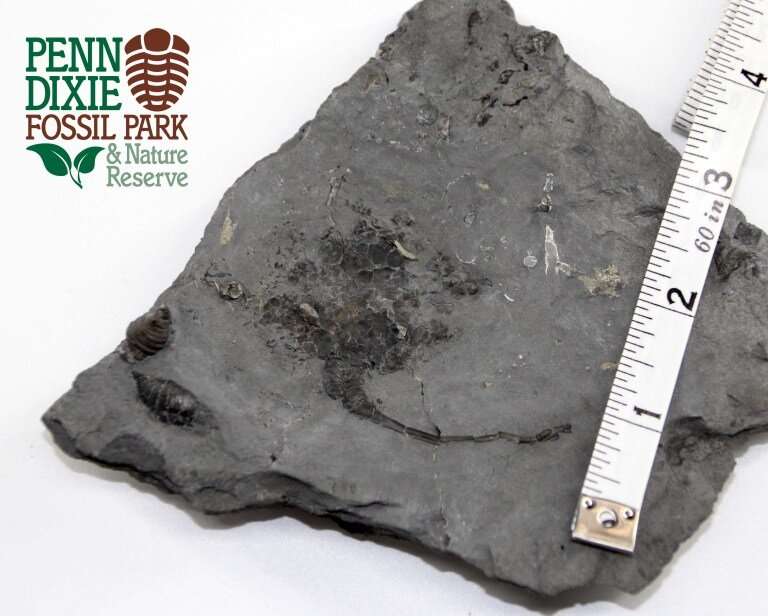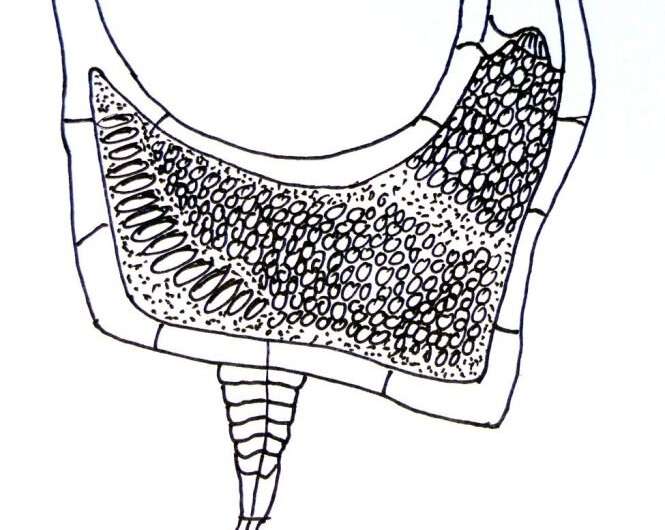This article has been reviewed according to Science X's editorial process and policies. Editors have highlighted the following attributes while ensuring the content's credibility:
fact-checked
trusted source
proofread
Researchers unearth rare carpoid fossil dating to the Devonian

A recent and unexpected discovery at Penn Dixie has provided new insight into the evolutionary history of an unusual group of fossils.
In April 2023, two off-duty members of Penn Dixie's educational team, Jonathan Hoag and James Hanna, uncovered the well-preserved remains of a mysterious and exceedingly rare animal—a "carpoid"—among the Devonian Period rocks at Penn Dixie. The remains, which date to approximately 382 million years old, are from a small invertebrate which lived in the ancient ocean that covered our region long before dinosaurs existed.
Carpoids are extinct echinoderms—they are related to living starfish, urchins, sea lilies (crinoids), and sand dollars. The unearthing of carpoid fossils from rocks of this particular age was unexpected.
Carpoids first appeared during the Middle Cambrian Period some 500 million years ago. They are rare—and their fossil record is spotty—which makes it difficult to track their evolutionary history. They are often not found between their first and last appearance in the rock record making them a "ghost lineage": they were there, but we just don't see them. We know the animal was alive, however, because we find its ancestors and descendants separated in the fossil record—perhaps by tens of millions of years.
Preliminary identification of the newly discovered fossils suggests that they belong to class of echinoderms known as Solutes—a branch of the carpoids previously thought to have gone extinct some 410 million years ago during the Early Devonian period. If initial interpretations are confirmed, then the new Penn Dixie fossils would be placed at roughly 382 million years old—extending the geological range of the Solutes by more than 25 million years.
The Penn Dixie carpoids are a "Lazarus taxon": an animal that disappears from the fossil record, then reappears much later. Much like the biblical Lazarus rising from the dead, a Lazarus taxon rises figuratively from the graveyard of global extinction. Thanks to the Penn Dixie find, there's new life in these old fossils.

Assembly member Jon D. Rivera said, "The unexpected yet momentous discovery of a carpoid fossil at Penn Dixie Nature Preserve is just the latest example of the park's uniqueness and a further testament to its deserving acclaim. This breakthrough finding, which has the potential to reimagine and rewrite our planet's geological record, conveys why Penn Dixie is a destination like no other in our region. I want to extend my congratulations to the entirety of the Penn Dixie staff who helped make possible this incredible discovery."
"This is indeed an oddity. In five decades of working on Paleozoic fossils in the northeastern U.S., in particular, I have looked at more than 1,000 Hamilton [rock formation] localities and have never seen even a scrap of one of these…This is definitely the most unusual occurrence from the bed that has ever been discovered," said paleontologist Dr. Carlton Brett, a distinguished research professor at the University of Cincinnati.
"To the untrained eye, the specimen may look like Paleozoic roadkill. Lucky for us, Hanna and Hoag could see that what they had found was something different and something special." Said Dr. Karl Flessa, a paleontologist at the University of Arizona.
"I have been collecting fossils at Penn Dixie since 2001 and had never heard of anyone finding a carpoid or a cystoid [related animal] at the park. In fact any relatively complete echinoderm is a rare find. As soon as I received the fossil for preparation from Jonathan, I realized it was a significant find with scientific importance," said Malcolm Thornley, an Ontario-based professional fossil preparator.
"This discovery is the most significant in the history of our organization, but also an incredibly special moment for science in Western New York. It is the honor of my career to be a very small part of the process that is unfolding," said Dr. Phil Stokes, a geologist and executive director of Hamburg Natural History Society/Penn Dixie.
"I feel very lucky and honored to be able to find such a cool animal. It is a groundbreaking discovery that could have been found by anyone, but we were just in the right place at the right time. The fact that I got to find it with my good friend makes it even better," said Jonathan Hoag, site manager at Hamburg Natural History Society/Penn Dixie.
Provided by University of Cincinnati





















